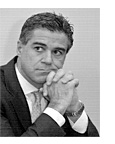THE KÄSEMANN CASE
In the late 1990s – 15 years after the end of the military dictatorship – the Argentinian Nobel Peace Prize laureate Adolfo Pérez Esquivel, together with a group of German-Argentinian victims and relatives, established contact with human rights organizations in Germany. As the Argentinian perpetrators had largely been granted amnesty in their own country, this group wanted to obtain their prosecution from abroad. The combined efforts of the “Koalition gegen Straflosigkeit” (coalition against impunity), lawyers Tino Thun, Roland Beckert and Wolfgang Kaleck, and the family of Elisabeth Käsemann were successful. In 2003 the German public prosecutor Walter Grandpair issued international arrest warrants against high-ranking members of the Argentinian military as well as the former leader of the military junta and president Jorge Videla, requesting their extradition to Germany. The German minister of justice at the time, Herta Däubler-Gmelin, fully supported this development.
When the amnesty law was lifted, the Argentinian judiciary wanted to hold the perpetrators to account in their own country and therefore turned down the request to have the suspects extradited to Germany. Examining magistrate Daniel Rafecas took over the investigation of the Käsemann case. In 2010 the main trial concerning the crimes against humanity committed at the El Vesubio secret detention camp was initiated, which included the Käsemann case. The Federal Republic of Germany acted as joint plaintiff. In 2011, chaired by the judges Leopoldo Bruglia, Jorge Gorini and Pablo Bertuzzi, the defendants were given lengthy or even life prison sentences. In the case against Jorge Videla, which included the murder of Elisabeth Käsemann, the verdict could not be delivered, as the defendant died before the end of the trial in May 2013. The case had been supported by relatives of her family as joint plaintiffs.
 Pablo Daniel Bertuzzi
Pablo Daniel BertuzziPablo Daniel Bertuzzi is involved as a judge in the proceedings in connection with the crimes committed during the last military dictatorship in Argentina. He delivered, among others, the judgements on the crimes against humanity committed at the secret detention camp El Vesubio and on the last president of the Argentinian military dictatorship, Reynaldo Antonio Benito Bignone, for his crimes committed in the secret detention camp Hospital Nacional Antonio Posados. At present he is acting judge at the Federal Criminal Court No. 5 which has also been delivering judgments on the so called “CAUSA ESMA UNIFICADA” for the last two years. The scope of this proceeding includes crimes against humanity that have been committed in connection with Argentina’s most important former torture camp “Escuela de Mecánica de la Armada” (ESMA), the Navy Mechanics School in Buenos Aires.
 Dr. Daniel Rafecas
Dr. Daniel RafecasAs a Federal Judge Nº 3, Criminal Circuit, Buenos Aires, from 2004 until now Daniel Rafecas deals with a wide criminal investigation known as First Region of the Army of the Argentinian junta which, involved thousands of crimes against humanity committed by members of the last Argentinian military dictatorship (1976-1983) and several dozens of clandestine centers of kidnapping and torture such as Olimpo, Vesubio, Mansion Sere and Coordinación Federal between many others.
